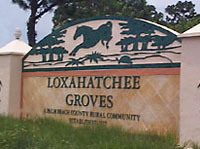The Loxahatchee Groves Planning & Zoning Committee recommended approval of amendments to the Unified Land Development Code on Tuesday, July 11 that would control overgrowth from private property onto roads.
However, the committee’s recommendation was not exactly what the Loxahatchee Groves Town Council and town staff had drafted for approval. The draft ordinance addresses only five invasive, exotic species, but the committee recommended that all plants be included.
The board also recommended deletion of a proposed requirement that landowners who do not keep plants trimmed could be required to cut them back 10 feet.
Planning consultant Jim Fleischmann explained that the council had determined encroachment of invasive plant species into the town rights of way negatively affect public roads and directed town staff to prepare an ordinance requiring property owners adjacent to public roads to keep such invasive plants on their property and off adjacent roads.
The draft ordinance makes two amendments to the ULDC to address clearance from public roads, stating that all property owners within the town are prohibited from allowing invasive, nonnative vegetation on their property from impacting any public road within the town and are responsible for maintaining invasive vegetation so that it does not grow onto a public road.
The second amendment requires that a property owner allowing the intrusion of invasive vegetation on a town public roadway would be required at all times in the future to keep it at least 10 feet from the edge of the graded portion of any paved or graded public road.
“There’s two provisions, one that requires property owners to not allow invasive, nonnative species to encroach into the roadway, and number two, if they’re found in violation of that provision, the town can require that they cut back those species 10 feet from the edge of the road,” Fleischmann said. “So, there’s a provision and a penalty.”
During public comment, Loxahatchee Groves Water Control District Supervisor Karen Piesley said she liked the ordinance, but asked why only invasive vegetation was included.
Fleischmann explained that the council’s direction was to address invasive nonnative vegetation. There is a definition of that in the town’s ULDC, which refers to the Florida Statutes definition, which lists five species: paperbark melaleuca, Brazilian pepper, Australian pine, suckering Australian pine and cat claw mimosa.
He agreed that the list is limited, but thought the council wanted to get something in place that is enforceable, and that those five species covered most of the concerns.
Committee Member Robin Crawford said acacia trees are also a nonnative plant that is very invasive, but added that he would not want an ordinance that would require the trimming back of live oak trees that might grow over and provide a canopy for the road.
Committee Member Grace Joyce asked whether the goal is to protect public safety, where plants create a line-of-sight hazard.
“We have no sidewalks in the town, and when folks are walking down the road, if any type of vegetation is too far into the right of way, it doesn’t allow for a safe place for people to walk, ride a horse, jog or whatever when a car is coming down the road,” Joyce said. “Folks should be responsible for the stuff that’s growing into the right of way from their property, regardless of what it is.”
Fleischmann said he had not gone through the code specifically to see if plants in rights of way could be defined as a public safety issue, but thought the council did not want to address any species except the five that were defined at this time. He did not recommend imposing a penalty on property owners who might have more desirable plants in the right of way.
Joyce also asked whether the penalty would be enforced through the same process as other violations, where a sworn affidavit would have to be signed at the office in order for it to be enforced. Town Manager Bill Underwood said that would probably be the case.
Underwood added that the town sends letters on a regular basis reminding residents to trim their hedges.
“Most people are pretty cooperative,” he said. “We want to get rid of the peppers because they are invasive.”
Committee members also discussed whether the 10-foot setback penalty was overreach, which could negatively impact some desirable growth in rights of way.
Committee Member Veronica Close made a motion to recommend that the council consider an ordinance regarding removal of vegetation along public roads in the town, and that it be all vegetation, not just invasive exotics. She also recommended that the 10-foot setback penalty not be imposed due to the possible negative effects on fencing and hedges in the town.
Fleischmann pointed out that the ordinance only addresses nonnative exotics. Close said she understood, but she wanted the council to consider all plants.
“If the purpose of this ordinance is for the safety of people traveling on the road, it doesn’t matter what kind of vegetation is blocking them, so that’s why my motion includes a recommendation to be all vegetation,” Close said.
Her motion carried 4-0, with Committee Member William Ford absent.
ABOVE:








